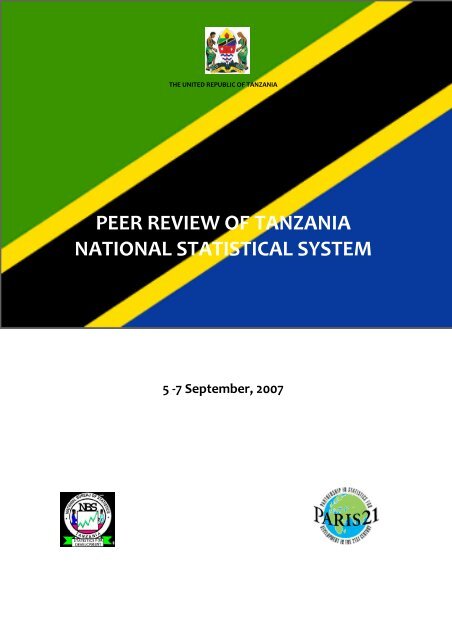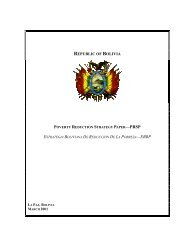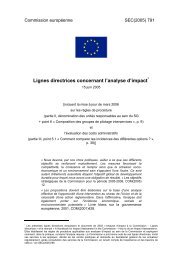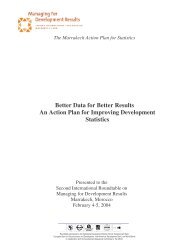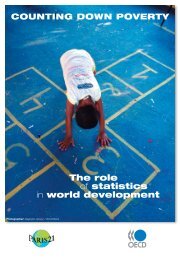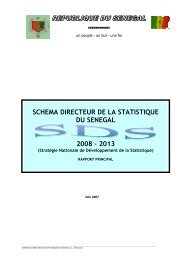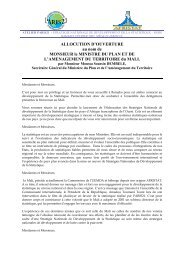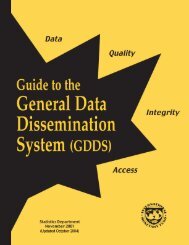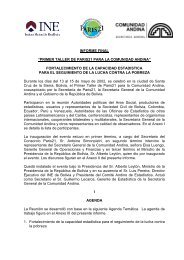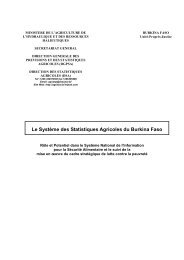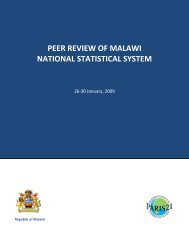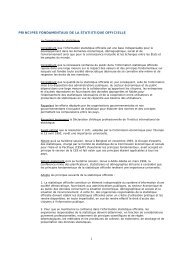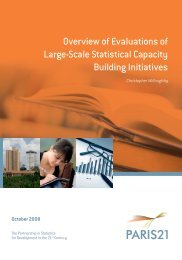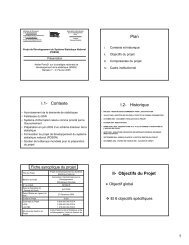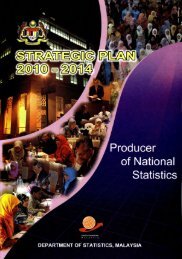Peer Review of Tanzania National Statistical System - Paris21
Peer Review of Tanzania National Statistical System - Paris21
Peer Review of Tanzania National Statistical System - Paris21
You also want an ePaper? Increase the reach of your titles
YUMPU automatically turns print PDFs into web optimized ePapers that Google loves.
THE UNITED REPUBLIC OF TANZANIA<br />
PEER REVIEW OF TANZANIA<br />
NATIONAL STATISTICAL SYSTEM<br />
5 ‐7 September, 2007
<strong>Peer</strong> review <strong>of</strong> <strong>Tanzania</strong> <strong>National</strong> <strong>Statistical</strong> <strong>System</strong>5‐7 September, 2007<br />
<strong>Peer</strong> review <strong>of</strong> <strong>Tanzania</strong> <strong>National</strong> <strong>Statistical</strong> <strong>System</strong><br />
5‐7 September, 2007<br />
<strong>Peer</strong> <strong>Review</strong>ers<br />
Ms. Efreda Chulu<br />
Central <strong>Statistical</strong> Office (Zambia)<br />
Mr. Patrick H. Choolwe<br />
Ministry <strong>of</strong> Finance (Zambia)<br />
Pr<strong>of</strong>. Nicholas N. N. Nsowah‐Nuamah Ghana <strong>Statistical</strong> Service<br />
Mr. Kwaben Oku‐Afari<br />
Ministry <strong>of</strong> Finance (Ghana)<br />
Secretariat<br />
Mr. Guest Charumbira, PARIS21<br />
Ms. Mary Strode, PARIS21<br />
The team was accompanied to most meetings outside the <strong>National</strong> Bureau <strong>of</strong> Statistics by Mrs.<br />
Radegunda Maro, Director <strong>of</strong> <strong>Statistical</strong> Operations in the <strong>National</strong> Bureau <strong>of</strong> Statistics.<br />
Acknowledgement<br />
The peer review team and facilitators would like to give sincere thanks to Ms Albina Chuwa the<br />
Director General <strong>of</strong> the <strong>National</strong> Bureau <strong>of</strong> Statistics (NBS) and to her staff for their assistance,<br />
hospitality and help given during the review mission. We are also highly indebted to the<br />
Ministerial Advisory Team <strong>of</strong> NBS who gave up their time to speak with the team, and who<br />
provided us with such frank and helpful answers. This should be <strong>of</strong> enormous help to countries<br />
wishing to undergo reform in the near future. PARIS21 would also like to thank the Governments<br />
<strong>of</strong> Zambia and Ghana for making their personnel available to peer review <strong>Tanzania</strong>, and to thank<br />
the individuals themselves for giving up their time and for all <strong>of</strong> their hard work to accomplish the<br />
peer review. Finally Oxford Policy Management is thanked for helping to facilitate the peer<br />
review and for making Mary Strode , Charumbira available for the mission.<br />
September, 2007<br />
(Re‐printed June, 2009)<br />
i
<strong>Peer</strong> review <strong>of</strong> <strong>Tanzania</strong> <strong>National</strong> <strong>Statistical</strong> <strong>System</strong>5‐7 September, 2007<br />
Table <strong>of</strong> Contents<br />
1 Executive summary and conclusions ......................................................................... 1<br />
1.1 Rationale for peer reviews ......................................................................................... 1<br />
1.2 Methodology............................................................................................................... 1<br />
1.3 Background ................................................................................................................. 1<br />
1.4 Observations .............................................................................................................. 2<br />
1.5 Recommendations: .................................................................................................... 2<br />
1.5.1 Recommendations on legal provisions for coordination ........................................ 2<br />
1.5.2 Recommendations on data quality standards for <strong>Tanzania</strong> .................................... 3<br />
1.5.3 Recommendation on unified statistical service ....................................................... 3<br />
1.5.4 User consultations on priorities ................................................................................ 3<br />
1.5.5 Recommendations on sustainability......................................................................... 4<br />
1.5.6 Recommendations on staffing .................................................................................. 4<br />
1.5.7 Recommendations on governance ........................................................................... 4<br />
1.5.8 Recommendations on data use and access ............................................................. 5<br />
2 Meetings with stakeholders ...................................................................................... 6<br />
2.1 NBS Managerial Staff ................................................................................................. 6<br />
2.2 Meeting with NBS pr<strong>of</strong>essional staff (managers absent) ....................................... 7<br />
2.3 Ministry <strong>of</strong> Education and Vocational Training ........................................................ 8<br />
2.4 United <strong>National</strong> Population Fund (UNFPA) .............................................................. 9<br />
2.5 Bank <strong>of</strong> <strong>Tanzania</strong> ....................................................................................................... 10<br />
2.6 Ministerial Advisory Board on NBS .......................................................................... 10<br />
2.7 Ministry <strong>of</strong> Finance – poverty monitoring ................................................................ 11<br />
2.8 Ministry <strong>of</strong> Finance Policy Analysis Division ............................................................ 12<br />
2.9 Ministry <strong>of</strong> Health and Social Welfare ..................................................................... 12<br />
2.10 Ministries <strong>of</strong> Agriculture and Food Security and Livestock<br />
Development............................................................................................................. 13<br />
2.11 United Nations Development Program (UNDP) ..................................................... 13<br />
2.12 Japan International Co‐operation Agency (JICA) ................................................... 14<br />
ii
<strong>Peer</strong> review <strong>of</strong> <strong>Tanzania</strong> <strong>National</strong> <strong>Statistical</strong> <strong>System</strong>5‐7 September, 2007<br />
3 Coordination and other conclusions arising from the interviews<br />
with stakeholders ..................................................................................................... 15<br />
3.1 Main topics identified ............................................................................................... 15<br />
3.2 Legal provisions for coordination <strong>of</strong> <strong>of</strong>ficial statistics ............................................ 15<br />
4 Recommendations for improvement ...................................................................... 17<br />
4.1 General ...................................................................................................................... 17<br />
4.2 Coordination <strong>of</strong> the statistical system ..................................................................... 17<br />
4.2.1 Economic statistics coordination ............................................................................. 17<br />
4.2.2 Other series ............................................................................................................... 18<br />
4.2.3 Recommendations on legal provisions for coordination ....................................... 18<br />
4.2.4 Recommendations on data quality standards for <strong>Tanzania</strong> ................................... 18<br />
4.3 Ethical and personnel issues for the NSS ................................................................ 19<br />
4.3.1 Recommendation on unified statistical service ..................................................... 20<br />
4.4 <strong>Statistical</strong> priorities .................................................................................................. 20<br />
4.4.1 User consultations on priorities ............................................................................... 21<br />
4.5 Technical assistance, structure and sustainability .................................................. 21<br />
4.5.1 Recommendations on sustainability........................................................................ 22<br />
4.6 Staffing ...................................................................................................................... 23<br />
4.6.1 Recommendations on staffing ................................................................................. 23<br />
4.7 Governance arrangements ...................................................................................... 24<br />
4.7.1 Recommendations on governance ......................................................................... 24<br />
4.8 NBS image and access .............................................................................................. 25<br />
4.8.1 Recommendations on data use and access ............................................................ 25<br />
4.9 The future .................................................................................................................. 25<br />
Annex A: <strong>Peer</strong> <strong>Review</strong> Timetable ...................................................................................................... 26<br />
Annex B: Meeting participants ........................................................................................................... 27<br />
iii
<strong>Peer</strong> review <strong>of</strong> <strong>Tanzania</strong> <strong>National</strong> <strong>Statistical</strong> <strong>System</strong>5‐7 September, 2007<br />
Abbreviations<br />
GDDS<br />
GDP<br />
HMIS<br />
TSED<br />
NBS<br />
OPM<br />
OCGS<br />
REPOA<br />
SDDS<br />
UNFPA<br />
UNDP<br />
General Data Dissemination <strong>System</strong><br />
Gross domestic product<br />
Health Management Information <strong>System</strong><br />
<strong>Tanzania</strong> Socio‐economic database<br />
<strong>National</strong> Bureau <strong>of</strong> Statistics<br />
Oxford Policy Management<br />
Office <strong>of</strong> Chief Government Statistician (Zanzibar)<br />
Research on Poverty Alleviation<br />
Special Data Dissemination Standard<br />
United Nations Fund for Population Activity<br />
United Nations Development Programme<br />
iv
<strong>Peer</strong> review <strong>of</strong> <strong>Tanzania</strong> <strong>National</strong> <strong>Statistical</strong> <strong>System</strong>5‐7 September, 2007<br />
1 Executive summary and conclusions<br />
1.1 Rationale for peer reviews<br />
The Economic Commission for Africa’s Committee on Development Information meeting in 2003<br />
decided that African countries, supported by PARIS21, would carry out peer reviews to ensure<br />
that good practice passes from country to country, based on the first hand experience <strong>of</strong> peers,<br />
to help to accelerate the change processes in reforming statistical systems. The peer reviews can<br />
advise on processes to design and implement <strong>National</strong> Strategies for the Development <strong>of</strong><br />
Statistics (NSDS) which are central to implementing the 2004 Marrakech Action Plan for<br />
Statistics. A pilot peer review was carried out in Ghana in 2005.<br />
The focus <strong>of</strong> the peer reviews is on governance <strong>of</strong> the <strong>National</strong> <strong>Statistical</strong> <strong>System</strong> (NSS), its<br />
organisation, strategic planning, service to users and funding and sustainability – all against the<br />
backdrop <strong>of</strong> the African Charter on Statistics which is being developed to set best practice<br />
principles for pr<strong>of</strong>essional independence, quality, mandates and resources, dissemination,<br />
protection <strong>of</strong> confidentiality, and coordination and cooperation.<br />
1.2 Methodology<br />
The peer review teams comprise both senior statisticians and senior policy makers from<br />
neighbouring countries to incorporate the views <strong>of</strong> both producers and users <strong>of</strong> statistics.<br />
<strong>Tanzania</strong> was reviewed by teams from Ghana and Zambia. The Director General <strong>of</strong> the NBS<br />
hosted the review, which was facilitated by consultants provided by the PARIS21 Secretariat.<br />
<strong>Review</strong> meetings form the core <strong>of</strong> the peer review. The team met managers and staff <strong>of</strong> the NBS<br />
and with the Ministerial Advisory Board as well as with a selection <strong>of</strong> other producers and key<br />
users <strong>of</strong> <strong>of</strong>ficial statistics from Bank <strong>of</strong> <strong>Tanzania</strong>, line ministries, and funders <strong>of</strong> the <strong>National</strong><br />
<strong>Statistical</strong> <strong>System</strong>, including the Ministry <strong>of</strong> Finance and Development Partners. Interviews were<br />
guided by a discussion schedule but reviewers had the flexibility to deviate from this schedule<br />
and to pursue topics in depth. The schedule <strong>of</strong> meetings is at Annex A and the list <strong>of</strong> people met<br />
is shown at Annex B. Notes on the individual meetings and conclusions and recommendations<br />
arising from them form the main body <strong>of</strong> this report.<br />
1.3 Background<br />
<strong>Tanzania</strong> has two statistical systems; one for <strong>Tanzania</strong> Mainland and the other for the semiautonomous<br />
islands <strong>of</strong> Zanzibar. Each part <strong>of</strong> <strong>Tanzania</strong> has different statistics acts in force. The<br />
statistics act for the mainland provides for the <strong>National</strong> Bureau <strong>of</strong> Statistics to coordinate the<br />
taking <strong>of</strong> population censuses for the Union. This <strong>Peer</strong> <strong>Review</strong> covered only the <strong>National</strong> Bureau<br />
<strong>of</strong> Statistics <strong>of</strong> the Mainland.<br />
The statistical system <strong>of</strong> <strong>Tanzania</strong> Mainland is somewhat decentralized. The <strong>National</strong> Bureau <strong>of</strong><br />
Statistics concentrates on economic statistics and censuses and surveys while ministries and<br />
1
<strong>Peer</strong> review <strong>of</strong> <strong>Tanzania</strong> <strong>National</strong> <strong>Statistical</strong> <strong>System</strong>5‐7 September, 2007<br />
departments are responsible for their routine data systems. However, the Statistics Act <strong>of</strong> 2002<br />
provides for the NBS to ensure there is pr<strong>of</strong>essionalism in the production <strong>of</strong> statistics.<br />
The <strong>National</strong> Bureau <strong>of</strong> Statistics was transformed into an Executive Agency in 1999. It is headed<br />
by a Director General who reports to the Ministerial Advisory Board. The first Director General <strong>of</strong><br />
the Bureau retired in November 2006. The current Director General was appointed in March<br />
2007. At the time <strong>of</strong> the <strong>Peer</strong> <strong>Review</strong> the new Director had been in post for some 6 months. Since<br />
its establishment as an agency it has been spearheading reforms in the statistical system <strong>of</strong><br />
<strong>Tanzania</strong>. The Bureau has been preparing a 3‐year rolling Strategic and Business Plan since 1999.<br />
1.4 Observations<br />
The views <strong>of</strong> the <strong>Review</strong> Team are that the Bureau has been very effective in producing<br />
commendable statistics under its mandate, with a lean and efficient organisation. An example is<br />
the publication <strong>of</strong> the 2002 Population Census within the year after enumeration was completed.<br />
The view <strong>of</strong> users was that the production and quality <strong>of</strong> statistics have improved dramatically in<br />
the last few years. Modernisation <strong>of</strong> the central agency has been successful, and the Ministerial<br />
Board is active, works well with the NBS management, and exercises leadership without<br />
interference in technical and political matters. The governance arrangements have worked<br />
extremely well, although the team has concerns about the future when the personalities involved<br />
change.<br />
There is a high level <strong>of</strong> interagency cooperation in statistics in <strong>Tanzania</strong>. This seems to work well<br />
where it is operating, however there were concerns about the potential for interference with the<br />
data by non‐statistical parties; and concerns that the collaboration between statistical producers<br />
was patchy, and possibly did not reflect priorities.<br />
The stakeholders interviewed were asked to name one issue where the NBS should make<br />
changes. The two issues most mentioned were coordination <strong>of</strong> the statistical system, and<br />
increasing the awareness and accessibility <strong>of</strong> the vast body <strong>of</strong> data held by NBS and other<br />
producers. Also mentioned were greater efforts on timeliness in some surveys; the coordination<br />
and the processing <strong>of</strong> routine data systems and the availability <strong>of</strong> a one‐stop‐statistics‐shop. For<br />
the statistics cadre, common service conditions, and opportunities for advancement and pride in<br />
the job were common themes.<br />
1.5 Recommendations:<br />
The recommendations <strong>of</strong> the peer reviewers are set out in detail in chapter 4. They are<br />
summarised below.<br />
1.5.1 Recommendations on legal provisions for coordination<br />
• Developing the legal instruments for the coordination <strong>of</strong> the NSS, including legal<br />
clarification on who is ultimately responsible for releasing <strong>of</strong>ficial statistics; and<br />
strengthening <strong>Tanzania</strong>’s legal provisions for data quality control mechanisms.<br />
2
<strong>Peer</strong> review <strong>of</strong> <strong>Tanzania</strong> <strong>National</strong> <strong>Statistical</strong> <strong>System</strong>5‐7 September, 2007<br />
1.5.2 Recommendations on data quality standards for <strong>Tanzania</strong><br />
• Developing specific quality standards for reviewing data series, ideally based on the IMF data quality standards<br />
(DQAF).<br />
• Amending legislation to clarify who is responsible for the release <strong>of</strong> <strong>of</strong>ficial statistics; and<br />
clarifying the process for ensuring quality standards.<br />
• A release and data access policy would ensure that the Government’s pre‐release access<br />
to data is fully transparent.<br />
• An inventory <strong>of</strong> data series from public agencies in <strong>Tanzania</strong> would aid coordination and<br />
optimal use <strong>of</strong> existing data.<br />
• Take steps to encourage IT coordination throughout the NSS.<br />
1.5.3 Recommendation on unified statistical service<br />
The team recommends that the Government <strong>of</strong> <strong>Tanzania</strong> considers the reintroduction <strong>of</strong> some<br />
kind <strong>of</strong> statistical service for the NSS statisticians to ensure:<br />
• All staff in the NSS subscribe to common pr<strong>of</strong>essional statistical standards; and the DG<br />
has authority over staff for whom she is the pr<strong>of</strong>essional head.<br />
• Staff are given an opportunity to develop their skills and careers.<br />
• Support is given by NBS to ministries to strengthen and improve the quality <strong>of</strong> routine<br />
data systems.<br />
• Statisticians have an opportunity to rotate around the NBS to improve their skills and<br />
career opportunities.<br />
• The entire statistical cadre is placed on similar conditions <strong>of</strong> service and are subjected to<br />
performance monitoring and incentives like their colleagues in NBS.<br />
1.5.4 User consultations on priorities<br />
• It is recommended that the NBS takes careful stock <strong>of</strong> the resources it has available, both<br />
financial and human, and matches these to its work plan. This will enable the resources<br />
gap to be established, as the basis for priority setting and further negotiations.<br />
• This should be followed by a full user consultation to determine priorities, and to explain<br />
and discuss trade‐<strong>of</strong>fs with the users.<br />
• The work programme should be recast and agreed with users and the Board.<br />
• The NBS should not attempt to raise funds from commissioned work at the expense <strong>of</strong><br />
core statistics to the detriment <strong>of</strong> the very high credibility and reputation <strong>of</strong> the NBS.<br />
3
<strong>Peer</strong> review <strong>of</strong> <strong>Tanzania</strong> <strong>National</strong> <strong>Statistical</strong> <strong>System</strong>5‐7 September, 2007<br />
1.5.5 Recommendations on sustainability<br />
• Seek pr<strong>of</strong>essional advice on developing the organisational structure, and be sparing in<br />
the introduction <strong>of</strong> new hierarchies.<br />
• Develop team working skills, and seek support on team building and on‐the‐job training<br />
with the view to building teams which are not dependent on one person.<br />
• Involve potential counterpart in developing terms <strong>of</strong> reference for technical<br />
consultants.<br />
• Insist that consultants submit full metadata and documentation <strong>of</strong> the tasks undertaken<br />
to the Methods and Standards department, and ensure that this is fully archived.<br />
• Make time in the working week for seminars discussing methods and techniques with<br />
teams <strong>of</strong> pr<strong>of</strong>essionals.<br />
• Raise the status <strong>of</strong> the Methods and Standards department to report directly to the DG<br />
and ensure that it is well staffed with pr<strong>of</strong>essional experts.<br />
• Be frank with funders about technical assistance needs and ensure that consultants are<br />
clear about their task <strong>of</strong> training staff and are assessed accordingly.<br />
• Organise frequent quality assurance audits <strong>of</strong> major statistical projects and keep full<br />
metadata to reassure users and funders that standards are being maintained<br />
• Develop a career path for non‐statistical pr<strong>of</strong>essionals in the agency, such as those<br />
skilled in IT, finance, management and the media.<br />
1.5.6 Recommendations on staffing<br />
• That the agency management looks carefully at its forward work programme for the next<br />
1‐2 years related to the number <strong>of</strong> staff required. Not all will be possible and some<br />
prioritisation involving users will be required.<br />
• The NBS should consider temporary appointments in covering short term work peaks.<br />
• Contract some activities to external research agencies or academia.<br />
• Engage in joint working with NSS members on routine data series in ministries.<br />
• Some staff could be out‐sourced to line ministries where greater efforts are required to<br />
strengthen routine series.<br />
• Ensure that the most able NSS staff are not drawn <strong>of</strong>f to support surveys at the expense <strong>of</strong><br />
improving routine data systems.<br />
1.5.7 Recommendations on governance<br />
• The team was impressed by the governance body and suggests that:<br />
• Board members use their position to further promote the products and credibility <strong>of</strong> the<br />
NBS.<br />
4
<strong>Peer</strong> review <strong>of</strong> <strong>Tanzania</strong> <strong>National</strong> <strong>Statistical</strong> <strong>System</strong>5‐7 September, 2007<br />
• The Board exercises guidance at a strategic level on the priorities <strong>of</strong> the NBS.<br />
1.5.8 Recommendations on data use and access<br />
• <strong>Statistical</strong> awareness should be included in government staff induction procedures; and<br />
statistical training should be repeated annually with key departments.<br />
• More use should be made <strong>of</strong> the press and media and pr<strong>of</strong>essional staff should present<br />
their own findings in a way that can be understood by the public, and point out their<br />
social and economic implications.<br />
• The library at NBS should be given a larger signboard which tells the public that data and<br />
publications can be accessed freely at this location.<br />
• NBS publications should be sold in bookshops around the country; this would include<br />
public <strong>of</strong>fices, but should also include private bookshops.<br />
• More is required to promote statistical products.<br />
5
<strong>Peer</strong> review <strong>of</strong> <strong>Tanzania</strong> <strong>National</strong> <strong>Statistical</strong> <strong>System</strong>5‐7 September, 2007<br />
2 Meetings with stakeholders<br />
2.1 NBS Managerial Staff<br />
The managerial team was asked about the Board, and it was explained that the Board discusses<br />
progress reports <strong>of</strong> the <strong>National</strong> Bureau <strong>of</strong> Statistics and approves its budget. The Board does<br />
not interfere with the general day‐to‐day operations <strong>of</strong> the Bureau. The Director General <strong>of</strong> NBS<br />
consults the Chairman when there is absolute need. Delegating upwards is not encouraged.<br />
Funding arrangements for the NBS start with the submission <strong>of</strong> the budget frame to the parent<br />
ministry for approval and consolidation to the ministry’s budget as well as imposition <strong>of</strong> budget<br />
ceiling based on the Treasury’s financial resources available in that particular financial year. The<br />
gaps between requested budget and approved amount are to be solicited from other sources<br />
such as funds available from commissioned works for services provided to clients, loans from<br />
financial institutions and grants from development partners as per Executive Agency Act No. 30<br />
<strong>of</strong> 1997. Expenditure usually depends on what has been approved and allocated. Funds from the<br />
government are used to fund Core Statistics, Personal Emoluments and Other Charges or<br />
administrative activities.<br />
During discussions, some questions were raised regarding the Principal Secretary <strong>of</strong> the parent<br />
ministry chairing the Advisory Board. It was pointed out that there some possibilities <strong>of</strong> conflict<br />
<strong>of</strong> interest, including the temptation <strong>of</strong> policy makers to influence statistical outcomes. The Chair<br />
responded that the relationship between the Chairman <strong>of</strong> the Board and the NBS was very<br />
pr<strong>of</strong>essional and such conflict was unlikely to arise for the time being. She further explained that<br />
since he is a major user <strong>of</strong> the NBS products he is in a pivotal position that enables him to<br />
champion the <strong>Statistical</strong> cause. The following specific points emerged from the discussions:<br />
• The NBS has 13 departments headed by managers. There are 4 directors heading the<br />
divisions. There are no deputies to the Director General.<br />
• NBS salaries are paid by Central Government but the NBS salary structure is different<br />
from that <strong>of</strong> general government. The NBS salaries are higher than those <strong>of</strong> general<br />
government.<br />
• NBS has a total staff compliment <strong>of</strong> 162. There are only 2 secretaries and 2 permanent<br />
drivers. Additional drivers are recruited when the need arises.<br />
• There are different schemes <strong>of</strong> service for NBS statisticians and those in other ministries<br />
and agencies; however there are proposals to revive the common statistical service.<br />
• There are performance contracts for managers and other senior employees. If an<br />
employee exceeds targets, a bonus is payable. If performance is poor sanctions may be<br />
applied<br />
• There exists a workers council which ensures there are checks and balances in the system<br />
6
<strong>Peer</strong> review <strong>of</strong> <strong>Tanzania</strong> <strong>National</strong> <strong>Statistical</strong> <strong>System</strong>5‐7 September, 2007<br />
• The entry level for a graduate statistician is the equivalent <strong>of</strong> $250. Statisticians in other<br />
ministries and agencies enter at a lower level<br />
2.2 Meeting with NBS pr<strong>of</strong>essional staff (managers absent)<br />
A meeting with staff was arranged (in the absence <strong>of</strong> senior managers). Staff were encouraged<br />
to air their views and were assured that their views would be treated as confidential. The staff<br />
observed that there was a high demand for statistics particularly through the monitoring and<br />
evaluation for MKUKUTA. MKUKUTA is the Swahili acronym for the second generation poverty<br />
reduction strategy (<strong>National</strong> Strategy for Growth and Reduction <strong>of</strong> Poverty). As a result <strong>of</strong> the<br />
NBS meeting much <strong>of</strong> the demand, the image <strong>of</strong> statistics is improving.<br />
On the negative side, the staff observed that there was an over reliance on consultants for survey<br />
analysis without full involvement <strong>of</strong> local statisticians. The 2003 Agriculture Sample Census was<br />
cited as an example where external consultants have been heavily relied upon at the expense <strong>of</strong><br />
locals. It was noted that senior managers in government tend to underplay the capabilities <strong>of</strong><br />
local statisticians. It was suggested that statistical output by locals, in the absence <strong>of</strong> technical<br />
endorsement by external consultants, would not be trusted by government. They felt that this<br />
was tantamount to ‘intellectual colonialism’. It was further pointed out that there were no<br />
incentives for data processing and analysis. Instead, there were incentives for field work and data<br />
collection. These issues lead to lack <strong>of</strong> retention <strong>of</strong> pr<strong>of</strong>essional staff. It was suggested that<br />
management might lack bargaining skills when it comes to negotiating technical assistance for<br />
statistics. In any case more consultation with staff over terms <strong>of</strong> reference and technical<br />
assistance was requested. Some staff felt the technical experts supplied were sometimes too old<br />
to understand modern technological developments.<br />
The meeting noted that in general, NBS has capacity but there is need to increase the numbers <strong>of</strong><br />
pr<strong>of</strong>essionals. One area that needs continuous attention is publicity. It was pointed out that<br />
statisticians lack marketing skills. Statisticians required training and motivation to explain in detail<br />
the social and economic implications <strong>of</strong> their statistics.<br />
The issue <strong>of</strong> publicity was discussed at length. The position <strong>of</strong> the publicity <strong>of</strong>ficer in the<br />
organization was also discussed. It was observed that the publicity <strong>of</strong>ficer is graded at level 5, the<br />
same level as the entry level <strong>of</strong> a statistician. The publicity <strong>of</strong>ficer reports to the Director General.<br />
It was however pointed out that the publicity section should work closely with statisticians in all<br />
sections. It was also observed that some statisticians underplay the importance <strong>of</strong> publicity in<br />
their work. The Ghana delegation advised that the electronic media could be utilized to the<br />
maximum and drama could be developed using popular statistics. This has worked very well in<br />
Ghana.<br />
7
<strong>Peer</strong> review <strong>of</strong> <strong>Tanzania</strong> <strong>National</strong> <strong>Statistical</strong> <strong>System</strong>5‐7 September, 2007<br />
The issue <strong>of</strong> further training was raised. One <strong>of</strong>ficer observed that demographers tend to be<br />
favoured for training to post graduate level at the expense <strong>of</strong> statisticians and other pr<strong>of</strong>essions<br />
in the department. It was however pointed out that post graduate training is not necessarily a<br />
pre‐requisite for promotion. It is productivity that counts.<br />
The recruitment <strong>of</strong> other pr<strong>of</strong>essions into the NBS was said to have brought some tension in the<br />
department. It was also observed that the organization needs these pr<strong>of</strong>essions to be<br />
productive, and they were necessary for a modern effective organisation. Whatever tensions may<br />
have arisen, they are being continuously addressed. The current structure <strong>of</strong> the organization<br />
affords slim chances <strong>of</strong> promotion for staff, and more opportunities for advancement were<br />
requested.<br />
It was observed that although NBS is an agency, the drafting <strong>of</strong> the scheme <strong>of</strong> service and other<br />
operational documents is guided by the national policy on employment and by the public service<br />
regulations. Following elaborate deliberations the statisticians indicated they were happy to be<br />
with the organization. They felt that statisticians in line ministries are under‐utilised. In other<br />
words, they feel that the statisticians in line ministries are not practicing their pr<strong>of</strong>ession to the<br />
maximum. In summary, the following specific points were raised:<br />
• Directorship posts (leadership positions) should not be widely publicized.<br />
• Interviews may not necessarily yield the best candidate for the job, assessment <strong>of</strong> past<br />
performance was also needed.<br />
• There has been some improvements in marketing the department and its products<br />
though more still needs to be done in increasing access to the media and to NBS’<br />
publications.<br />
• They are happy that the NBS recognizes other pr<strong>of</strong>essions who work in the agency as <strong>of</strong><br />
equal importance.<br />
2.3 Ministry <strong>of</strong> Education and Vocational Training<br />
The Management Information <strong>System</strong> <strong>of</strong> the Ministry <strong>of</strong> Education and Vocational Training is<br />
responsible for the collection <strong>of</strong> education data from primary schools, secondary schools, teacher<br />
education institutions and the non‐formal system. Data is collected by age grade and sex. Data on<br />
teachers are collected by qualification. Data are also collected on infrastructure and books. The<br />
data are regularly processed and disseminated to stakeholders such as UNESCO, the<br />
government, the poverty monitoring system. The NBS is consulted on a regular basis. Education<br />
administrative data are compared with data from censuses and surveys for validation purposes.<br />
The statistics also feed into the <strong>Tanzania</strong> Socio‐Economic Database (TSED). The <strong>of</strong>ficers in the<br />
Ministry <strong>of</strong> Education understood that their promotion and career development was in the hands<br />
<strong>of</strong> the Ministry <strong>of</strong> Planning.<br />
8
<strong>Peer</strong> review <strong>of</strong> <strong>Tanzania</strong> <strong>National</strong> <strong>Statistical</strong> <strong>System</strong>5‐7 September, 2007<br />
Officers from the policy side <strong>of</strong> the Ministry said that these statistics are <strong>of</strong> minimal use to them.<br />
They said they rely mostly on qualitative data they collect. They were asked how they would<br />
access statistics from NBS to support their policies, and replied that they would go through their<br />
own statisticians who had contacts inside the NBS.<br />
2.4 United <strong>National</strong> Population Fund (UNFPA)<br />
In his opening remarks the UNFPA Assistant representative informed the meeting that his<br />
organization is interested in statistics for many uses amongst which are the statistics needed for<br />
poverty monitoring and the Millennium Development Goals (MDGs). He said the performance <strong>of</strong><br />
the NBS has been commendable in recent years. However, the UNFPA as an organization were<br />
seriously concerned about the retirement <strong>of</strong> top management <strong>of</strong> the NBS in the year 2006. It<br />
seems there were no elaborate plans for a smooth handover.<br />
The meeting was further informed that demand for data is increasing and there are gaps in the<br />
supply <strong>of</strong> reliable information. The end result is that there is a proliferation <strong>of</strong> data production<br />
and statistics from many un<strong>of</strong>ficial quarters. These un<strong>of</strong>ficial figures are quoted from time to<br />
time and this tends to confuse policy makers and other users. For poverty monitoring it has been<br />
agreed that statistics for use in that area have to be sanctioned by the <strong>National</strong> Bureau <strong>of</strong><br />
Statistics for <strong>Tanzania</strong> Mainland and the Office <strong>of</strong> Chief Government Statistician in the case <strong>of</strong><br />
Zanzibar. One short coming in the production <strong>of</strong> statistics is that routine data are not directly<br />
linked to, or sanctioned by the NBS. In the case <strong>of</strong> Zanzibar the situation is changing since the<br />
statistics on the Islands are now coordinated by the Office <strong>of</strong> Chief Government Statistician.<br />
The health system is particularly problematic, as it has many systems running different s<strong>of</strong>tware<br />
which cannot be shared easily with the <strong>National</strong> Bureau <strong>of</strong> Statistics. The education sector has a<br />
project funded by UNFPA, UNICEF, UNESCO and the European Union. The project is coordinated<br />
by the Prime Minister’s Office for the Mainland and the Chief Minister’s Office in the case <strong>of</strong><br />
Zanzibar. It was observed that the NBS is focusing on the macro level for its data collection.<br />
Routine data systems would compliment the NBS efforts to complete the picture. Routine data<br />
systems would provide information at the micro level. The meeting was further informed that the<br />
local government management information system was introduced 2 years ago but progress is<br />
rather slow.<br />
It was observed that there is no coordination amongst data producers and resources for statistics<br />
are on the low side. It was further observed that lack <strong>of</strong> equipment at the local level hinders the<br />
use <strong>of</strong> the <strong>Tanzania</strong> Socio‐Economic Database (TSED) and other computer based information.<br />
Regarding dissemination and publicity, it was mentioned that the NBS Library is not easily<br />
accessible for all, and that NBS products are not available in other libraries. In general, NBS<br />
products are not produced in a timely manner. However, the Population and Housing Census was<br />
processed very quickly, it was observed.<br />
9
<strong>Peer</strong> review <strong>of</strong> <strong>Tanzania</strong> <strong>National</strong> <strong>Statistical</strong> <strong>System</strong>5‐7 September, 2007<br />
In conclusion, the NBS was advised to prepare succession plans and develop a skills building<br />
program.<br />
2.5 Bank <strong>of</strong> <strong>Tanzania</strong><br />
Discussions with the Bank <strong>of</strong>ficials revolved around the production the production <strong>of</strong> the national<br />
accounts, quarterly GDP, the consumer price index, the balance <strong>of</strong> payments and tourism<br />
statistics. <strong>Tanzania</strong> is participating in the General Data Dissemination <strong>System</strong> <strong>of</strong> the International<br />
Monetary Fund, and the meeting expressed a desire to move to the SDDS. The standards have<br />
not yet been achieved in terms <strong>of</strong> timeliness. The EastAfritac is assisting in the preparation <strong>of</strong> the<br />
quarterly GDP. Once this has been achieved, <strong>Tanzania</strong> may consider graduating to the Special<br />
Data Dissemination <strong>System</strong>.<br />
The Bank observed that the NBS produces excellent statistics on inflation. However, core<br />
inflation is not calculated. The CPI was last rebased in 2001. It was further observed that the<br />
development <strong>of</strong> relevant statistics is done in close collaboration with the users. The Bank and the<br />
NBS do collaborate in the production <strong>of</strong> some statistics. Tourism statistic and foreign private<br />
capital flows are carried out as a joint effort. The Bank also partially finances some <strong>of</strong> NBS<br />
activities such as the CPI and Industrial Statistics. The Bank is responsible for the production <strong>of</strong><br />
Balance <strong>of</strong> Payments and publishes a report on an annual basis.<br />
2.6 Ministerial Advisory Board on NBS<br />
The Chairman <strong>of</strong> the Ministerial Advisory Board who is also the Principal Secretary <strong>of</strong> the Ministry<br />
<strong>of</strong> Planning, Economy and Empowerment opened the meeting an introduced members <strong>of</strong> the<br />
Board. It was explained that members <strong>of</strong> the Board are at Director Level. The Chairman briefed<br />
the meeting about the responsibilities <strong>of</strong> the Board. He explained that the Board meets quarterly<br />
but may hold ad hoc meetings if the need arises. As long as members are invited in good time<br />
they usually attend. Members are paid a sitting allowance.<br />
The <strong>National</strong> Bureau <strong>of</strong> Statistics was established in 1946. It was transformed to an Executive<br />
Agency in 1999 as part <strong>of</strong> government wide reforms to promote efficiency in the delivery <strong>of</strong><br />
services. A new statistics act was passed in 2002. The act empowers the NBS to produce statistics<br />
for poverty monitoring and other uses. All executive agencies (about 20) have ministerial<br />
advisory boards. Membership <strong>of</strong> the NBS Ministerial Advisory Board is drawn from a wide<br />
spectrum. Members serve for 3 years with a possibility <strong>of</strong> renewal. There is a representative <strong>of</strong><br />
regional administration on the Board. It was explained that the Board does not discuss the<br />
outputs <strong>of</strong> the NBS. The Board is there to provide policy guidance and give indications <strong>of</strong> what<br />
has to be produced. Once the budget has been approved the Director General and senior<br />
management have full mandate to spend the resources. The Board exercises what is termed eyes<br />
on hands <strong>of</strong>f type <strong>of</strong> management. The head <strong>of</strong> an agency will only consult the chair for guidance.<br />
10
<strong>Peer</strong> review <strong>of</strong> <strong>Tanzania</strong> <strong>National</strong> <strong>Statistical</strong> <strong>System</strong>5‐7 September, 2007<br />
The NBS is given the opportunity to prioritise its work program. If there are resource constraints,<br />
the NBS is expected to protect core statistics. The organization is permitted to do commissioned<br />
work to augment resources.<br />
The review team was informed that statistics still has to fight for the meagre resources. Although<br />
80% <strong>of</strong> MKUKUTA money is channelled to the NBS for monitoring purposes, there was still a<br />
shortfall in resources. The move by development partners from project support to budget<br />
support has implied that there are cuts in resources. The NBS has to bargain for the reduced<br />
national cake like anyone else. The review team pointed out that the rules for debt forgiveness<br />
initially implied that the resources that were supposed to be for debt payments were supposed<br />
to be channelled to social development and that statistical measurement would be expected to<br />
monitor its effectiveness. The frank response from the Chair was that it is wrongly assumed in<br />
some quarters that poor countries had resources to pay back their debts. For many, there were<br />
no resources to pay back in the first place.<br />
2.7 Ministry <strong>of</strong> Finance – poverty monitoring<br />
<strong>Tanzania</strong> has developed a second generation poverty reduction strategy known as <strong>National</strong><br />
Strategy for Growth and Reduction <strong>of</strong> Poverty and will run for a period <strong>of</strong> 5 years. The Swahili<br />
acronym is MKUKUTA. Experiences from the first PRSP indicated that there was a need for a<br />
monitoring system. The monitoring system being developed has 3 working groups. The first is the<br />
Data Group and comprises the Survey and Census Working group and the Routine Data Working<br />
Group. The second is the Research and Analysis with secretariat at Research on Poverty<br />
Alleviation (REPOA) and is chaired by the Ministry <strong>of</strong> Planning, Economy and Empowerment. The<br />
third group is the Communication. It is chaired by the Director <strong>of</strong> Poverty Eradication and is<br />
responsible for disseminating the outputs from the monitoring system. Technical working groups<br />
have representatives from other ministries and the private sector. All working groups convene<br />
monthly meetings. The monitoring system is financed by donors and government (20% from<br />
government). On average the NBS receives US$ 4‐5 million per year. This year the figure is slightly<br />
higher at $7 million. The NBS total budget is roughly 10 billion T Shillings.<br />
One <strong>of</strong> the major outputs from these systems is the Poverty and Human Development Report<br />
which is produced once every 2 years. The <strong>Tanzania</strong> Socio‐Economic Database (TSED) is also fed<br />
from the outputs <strong>of</strong> the statistical system and routine data systems. The TSED has some 2000+<br />
indicators while MKUKUTA has 84 indicators. All Millennium Development Goals are covered<br />
from these systems. Due to resource constraints the TSED is not updated regularly enough.<br />
Three important activities are also undertaken on an annual basis. These are the production <strong>of</strong><br />
the MKUKUTA annual implementation report, annual review <strong>of</strong> the general budget support and<br />
Poverty Policy Week. The poverty policy week gives role players the opportunity to exchange<br />
new ideas on poverty eradication.<br />
The PRSP unit would like the NBS to speed up analysis <strong>of</strong> data and translate some <strong>of</strong> their<br />
outputs to Swahili.<br />
11
<strong>Peer</strong> review <strong>of</strong> <strong>Tanzania</strong> <strong>National</strong> <strong>Statistical</strong> <strong>System</strong>5‐7 September, 2007<br />
Zanzibar has its own strategy named MKUZA. It also has similar monitoring systems like those for<br />
Mainland <strong>Tanzania</strong>.<br />
2.8 Ministry <strong>of</strong> Finance Policy Analysis Division<br />
The Policy Division <strong>of</strong> the Ministry <strong>of</strong> Finance indicated that their relationship with the <strong>National</strong><br />
Bureau <strong>of</strong> Statistics is not very strong at the moment but is continuously being developed. The<br />
most important figures for them are the national accounts and the consumer price index. They<br />
usually access these through the NBS website. If there is need to clarify any issues they visit the<br />
<strong>of</strong>fice. They indicated that they access financial data from the Bank <strong>of</strong> <strong>Tanzania</strong>.<br />
The Ministry is <strong>of</strong> the opinion that there are a number <strong>of</strong> gaps in statistics. Government finance<br />
statistics are not well developed and the <strong>Tanzania</strong> Socio‐Economic Database has some gaps. They<br />
would encourage the NBS to build an awareness program to publicise themselves and their<br />
products.<br />
2.9 Ministry <strong>of</strong> Health and Social Welfare<br />
The Ministry <strong>of</strong> Health and Social Welfare in <strong>Tanzania</strong> is responsible for the collection <strong>of</strong> data for<br />
the health sector and is said to have a complicated system <strong>of</strong> data collection. The Health<br />
Information and Research Section has 4 units. These are the Health Management Information<br />
<strong>System</strong> (HMIS), Operational Research, Demographic Surveillance Data <strong>System</strong> and the Computer<br />
<strong>System</strong>.<br />
The HMIS collects information from health facilities in the country including faith based facilities.<br />
Data collection instruments vary depending on size <strong>of</strong> institution. The outpatient system is<br />
standard for all facilities. The coding systems used are those developed by the World Health<br />
Organisation. The ICD9 coding system is used for coding diseases.<br />
The operational research section compliments routine system and uses WHO models. There is<br />
also the Demographic Surveillance data system collects deaths and other demographic data. This<br />
was introduced because the registration system has failed.<br />
There are other health administrative systems that produce other data and operate<br />
independently <strong>of</strong> the main programs. These are the TB and Leprosy, <strong>National</strong> AIDS Control<br />
program that produces data from sentinel sites. The Epidemiology and Reproductive Health also<br />
produce administrative data. It was mentioned that reforms are ongoing (through the Health<br />
Matrix Network) to harmonise the different systems in the health sector. About 33 indicators<br />
have been identified to measure the performance <strong>of</strong> the health sector.<br />
The production <strong>of</strong> reports from the administrative systems has a 2 year lag. The <strong>National</strong> Bureau<br />
<strong>of</strong> Statistics provides health statistics through household surveys. In recent years the NBS has<br />
carried out the Demographic and Health Survey, AIDS Survey, Disability Survey and Service<br />
Provision.<br />
12
<strong>Peer</strong> review <strong>of</strong> <strong>Tanzania</strong> <strong>National</strong> <strong>Statistical</strong> <strong>System</strong>5‐7 September, 2007<br />
In conclusion, the health <strong>of</strong>ficials indicated that they would like the NBS to provide awareness <strong>of</strong><br />
the existence <strong>of</strong> statistical units in ministries, to give support to those statistical units in the form<br />
<strong>of</strong> training and technical support. They would also like the <strong>Tanzania</strong> <strong>Statistical</strong> Association to be<br />
revived.<br />
2.10 Ministries <strong>of</strong> Agriculture and Food Security and Livestock Development<br />
The <strong>Peer</strong> <strong>Review</strong> Team met with <strong>of</strong>ficials <strong>of</strong> the Ministries <strong>of</strong> Agriculture and Food Security and<br />
Livestock Development. These ministries have several departments with special data<br />
requirements. Some <strong>of</strong> the departments are Irrigation, Land Use Planning, Plant Health and<br />
Protection, Food Security, Extension, Agriculture Mechanisation. Most <strong>of</strong> these collect their own<br />
data through their administrative systems. One important issue to note is that Extension Officers<br />
act as data collectors and they belong to the Ministry <strong>of</strong> Local Government. This may bring<br />
problems <strong>of</strong> coordination, time use and data quality. In the Ministry <strong>of</strong> Livestock some extension<br />
workers are now trained as data collectors.<br />
To complement statistical information required by the systems, it has been agreed that a Sample<br />
Census <strong>of</strong> Agriculture will be conducted every 5 years with a big survey every 10 years. The last<br />
such census was conducted in 2003 and covered 480 000 households. The processing <strong>of</strong> the<br />
results has been relatively slow. Detailed results are only being produced in the year 2007.<br />
The following specific issues were raised during the discussions:<br />
• Routine data do not tally with statistical data from other sources<br />
• Respondents would not give true livestock numbers because <strong>of</strong> concerns about taxation<br />
• Cross‐region migration affects livestock numbers and makes estimation problematic<br />
• Last population and housing census did not include questions on land ownership,<br />
cultivation and animal husbandry. These questions were meant to provide a firm<br />
sampling frame for future agricultural surveys<br />
• Data from routine systems provide inconsistent figures. For example in some districts<br />
area planted was bigger than the total area <strong>of</strong> the district.<br />
In conclusion, the Ministries would like the NBS to live up to their responsibility, which is a one<br />
stop centre for statistics. They have to increase their human resource base and provide more<br />
support to other statistical units.<br />
2.11 United Nations Development Program (UNDP)<br />
Following the introduction <strong>of</strong> the <strong>Peer</strong> <strong>Review</strong> by the Director General, Mr. Salla, Head <strong>of</strong> the Pro‐<br />
Policy Team at UNDP <strong>Tanzania</strong> led the discussions. He mentioned that UNDP has been involved<br />
with the <strong>National</strong> Bureau <strong>of</strong> Statistics for many years, particularly in the area <strong>of</strong> capacity building.<br />
In general issues in health and education need good statistics. The UNDP has assisted the NBS in<br />
short term training, specified surveys and studies, support to the Census 2002 analysis and<br />
statistical publications and dissemination. The UNDP has utilized NBS products in a number <strong>of</strong><br />
areas, particularly in the compilation <strong>of</strong> the Poverty and Human Development Report (PHDR).<br />
13
<strong>Peer</strong> review <strong>of</strong> <strong>Tanzania</strong> <strong>National</strong> <strong>Statistical</strong> <strong>System</strong>5‐7 September, 2007<br />
Over the past few years it has been observed that the quality <strong>of</strong> statistical products has improved<br />
significantly. In the past, Ministries, Departments and Agencies used to produce sets <strong>of</strong> data<br />
which were conflicting. NBS has managed to improve the situation following Executive Agency<br />
Status and the Statistics Act <strong>of</strong> 2002. Other agencies outside government also produce data (e.g.<br />
Economic and Social Research Foundation, Universities and other private researchers). The NBS<br />
should continue to play the key role <strong>of</strong> harmonization. It was observed that statistical capacity in<br />
government does exist. What is lacking is close collaboration with the NBS, with the NBS taking<br />
the lead in harmonization. NBS are advised to develop a program to support line ministries. Such<br />
a program should be funded by government and the development partners. It would be ideal if<br />
this could be included in the <strong>Tanzania</strong> <strong>Statistical</strong> Master Plan which will be finalised early next<br />
year.<br />
In general, UNDP is comfortable with NBS products. What is needed in the immediate future is<br />
for the NBS to publicize their work and improve their dissemination strategies.<br />
2.12 Japan International Co‐operation Agency (JICA)<br />
The Resident Representative introduced his team and the statistics desk <strong>of</strong>ficer. Japan has been<br />
assisting <strong>Tanzania</strong> in the field <strong>of</strong> statistics for some time.<br />
The desk <strong>of</strong>ficer for statistics briefed the <strong>Peer</strong> <strong>Review</strong> Team about a new project JICA has<br />
embarked on at the NBS. The project is called the <strong>Tanzania</strong> Integrated <strong>Statistical</strong> Database (TISD).<br />
It is basically a data warehouse. This project has been launched to assist <strong>Tanzania</strong> build a<br />
historical database, a data archive, that may be utilized for various purposes in the future. The<br />
meeting was informed that not many countries are in the habit <strong>of</strong> archiving their statistical data.<br />
This lack <strong>of</strong> historical data bases makes it difficult to do meaningful analysis <strong>of</strong> economic and<br />
social development. The project is in the process <strong>of</strong> creating for all surveys and some routine<br />
systems:<br />
• Raw data – Census, Household Budget Survey, Demographic and Health Survey, etc.<br />
• Table data ‐ in Excel format<br />
• Documentation.<br />
The project will be extended to Zanzibar. In the long run it is expected that line ministries would<br />
also be covered. During the discussions that followed it was recommended that the authorities<br />
should consider changing the project name to avoid confusion with the <strong>Tanzania</strong> Socio‐Economic<br />
Database. <strong>Tanzania</strong> Integrated Data Warehouse was suggested.<br />
In conclusion the JICA recommended that steps be taken to improve the routine data systems in<br />
the agriculture sector<br />
14
<strong>Peer</strong> review <strong>of</strong> <strong>Tanzania</strong> <strong>National</strong> <strong>Statistical</strong> <strong>System</strong>5‐7 September, 2007<br />
3 Coordination and other conclusions arising from the<br />
interviews with stakeholders<br />
3.1 Main topics identified<br />
Following the 3 day discussions with the various stakeholders, the peer reviewers established the<br />
several topics for inclusion in the report as recommendations. These are shown below.<br />
Coordination <strong>of</strong> the national statistical system was the most common topic identified by<br />
stakeholders as the one issue they would most like to see improved.<br />
1) Lack <strong>of</strong> coordination <strong>of</strong> statistical activities.<br />
2) Harmonization <strong>of</strong> statistics.<br />
3) NBS should have more say in statistical production in ministries.<br />
4) Succession planning.<br />
5) Institutional arrangements (need for harmonization).<br />
6) Role <strong>of</strong> technical assistance has to be properly regulated.<br />
7) Promotion may be a problem: Vacant posts are open to competition from all<br />
statisticians across the board.<br />
8) Principal Secretary being Chairman <strong>of</strong> the Board.<br />
9) Need for position <strong>of</strong> Deputy Director General.<br />
10) Funding Gap: Technical Working Groups can Assist with prioritization.<br />
11) Allocation <strong>of</strong> sections in Directorates is rather haphazard.<br />
3.2 Legal provisions for coordination <strong>of</strong> <strong>of</strong>ficial statistics<br />
One <strong>of</strong> the main issues arising from the review was the role <strong>of</strong> NBS in coordinating <strong>of</strong>ficial<br />
statistics in the country. On studying the law we found that Para 15.‐41) empowers the NBS to<br />
collect statistics set out in a Schedule to the Act and directs the Bureau to establish standards<br />
and to ensure their use by all users <strong>of</strong> <strong>of</strong>ficial statistics. Official statistics are not defined in the<br />
act, but statistics includes censuses and all or any <strong>of</strong> the statistics set out in the Second Schedule.<br />
The schedule in itself is quite comprehensive, although not specific. It does include statistics<br />
which can only be derived from statistical producers beyond the NBS. The Act envisaged the NBS<br />
coordinating the NSS as can be seen in 0, but is not specific about how this is to be carried out.<br />
15
<strong>Peer</strong> review <strong>of</strong> <strong>Tanzania</strong> <strong>National</strong> <strong>Statistical</strong> <strong>System</strong>5‐7 September, 2007<br />
Figure 3.1 Legal provisions for statistical coordination<br />
Below are some <strong>of</strong> the provisions relating to statistical coordination.<br />
5. –(I)The functions <strong>of</strong> the <strong>National</strong> Bureau <strong>of</strong> Statistics shall be:<br />
a) to draw up an overall national statistics plan for <strong>of</strong>ficial statistics and keep it under continual<br />
review.<br />
b) to establish statistical standards and ensure their use by all producers <strong>of</strong> <strong>of</strong>ficial statistics so<br />
as among other things to facilitate the integration and comparison <strong>of</strong> the statistics produced<br />
both nationally and internationally.<br />
c) co‐ordinate statistical activities in the country so, as –<br />
(i) to avoid duplication <strong>of</strong> efforts in the production <strong>of</strong> statistics<br />
(ii) to ensure optimal utilisation <strong>of</strong> available resources<br />
(iii) to reduce the burden on respondents for providing statistical data;<br />
(iv) to ensure uniform standards <strong>of</strong> statistical data<br />
d) to collect, compile, analyse and disseminate statistics and related information.<br />
e) to provide statistical services and pr<strong>of</strong>essional assistance to <strong>of</strong>ficial bodies and the public at<br />
large.<br />
16
<strong>Peer</strong> review <strong>of</strong> <strong>Tanzania</strong> <strong>National</strong> <strong>Statistical</strong> <strong>System</strong>5‐7 September, 2007<br />
4 Recommendations for improvement<br />
4.1 General<br />
Stakeholders seemed to agree that the quality and quantity <strong>of</strong> output for the NBS had improved<br />
dramatically in recent years. Products such as TSED were widely praised and relationships<br />
between users, producers and international agencies were cordial, positive and extremely<br />
supportive.<br />
Stakeholders’ concerns were mainly focussed on other producers <strong>of</strong> statistics in the country.<br />
There was wide consensus over the need to improve the quality <strong>of</strong> data from the <strong>National</strong><br />
<strong>Statistical</strong> <strong>System</strong> (NSS). The NBS was created on 26th March 1999 as a semi‐autonomous<br />
executive agency, and this was supported by the Statistics Act <strong>of</strong> 2002. Around this time the old<br />
unified statistical service under the Ministry <strong>of</strong> Planning was disbanded, and the statisticians<br />
working in statistical units became direct employees <strong>of</strong> the ministerial statistical units where they<br />
were employed. The team found at least a statistician working in a line ministry who was<br />
unaware <strong>of</strong> these changes in his reporting arrangements.<br />
4.2 Coordination <strong>of</strong> the statistical system<br />
One <strong>of</strong> the common threads which emerged from interviews with stakeholders was the need to<br />
strengthen the statistical system beyond the NBS, to include other producers <strong>of</strong> statistics. There<br />
was very little concern among stakeholders over the quality <strong>of</strong> NBS products, although some<br />
improvements were recommended for the timeliness its products, and in respect <strong>of</strong> improving its<br />
national pr<strong>of</strong>ile and publicity about its products. More will be said <strong>of</strong> these issues later in the<br />
report.<br />
The peer review uncovered several obstacles to better coordination in the NSS, these included:<br />
• The lack <strong>of</strong> a formal mechanism to quality assure <strong>of</strong>ficial statistics, prior to their release.<br />
• Lack <strong>of</strong> clarity about formal release procedures on <strong>of</strong>ficial statistics.<br />
• Lack <strong>of</strong> ethical coordination for members <strong>of</strong> the NSS who are not members <strong>of</strong> the NBS<br />
4.2.1 Economic statistics coordination<br />
The current arrangements for coordinating the national statistical system are largely informal and<br />
appear to operate in respect <strong>of</strong> economic statistics and for a limited number <strong>of</strong> other series. The<br />
arrangements for agreeing and releasing national accounts statistics and some other series<br />
published in the Economic Survey, which is a pre‐budget statutory instrument, appear to have a<br />
regular and agreed procedure; however the team had some concerns about Government’s<br />
access to statistics prior to their publication, and the potential for interference with the results.<br />
The team also appreciated that in the case <strong>of</strong> national accounts in particular, obtaining consensus<br />
and full co‐operation from key stakeholders such as the Macro Department in the Ministry <strong>of</strong><br />
17
<strong>Peer</strong> review <strong>of</strong> <strong>Tanzania</strong> <strong>National</strong> <strong>Statistical</strong> <strong>System</strong>5‐7 September, 2007<br />
Finance and the Central Bank <strong>of</strong> <strong>Tanzania</strong> is an essential part <strong>of</strong> the process <strong>of</strong> gaining credibility<br />
from major Government users. However a clear data access policy, and publication policy would<br />
be desirable, and some clarity on who is responsible for actively publishing the data would be<br />
helpful. This point is also raised in the IMF ROSC <strong>of</strong> 2004. <strong>Statistical</strong> <strong>of</strong>fices <strong>of</strong>ten fail to get the<br />
credit for the economic series they produce, and the Bank or Ministry <strong>of</strong> Finance is <strong>of</strong>ten the<br />
quoted source. This is detrimental to the image <strong>of</strong> the Bureau and its negotiations for resources.<br />
4.2.2 Other series<br />
The arrangements for data coordination with sectoral ministries are more informal, and the team<br />
had concerns about the thoroughness <strong>of</strong> quality control procedures. In some cases the NBS and<br />
the producing ministry work together to reach a consensus over data, but this does not<br />
necessarily ensure data quality. The 2002 Statistics Act gives some powers to NBS to coordinate<br />
the national statistical system (see 0).<br />
It is the view <strong>of</strong> the team that the coordination powers in <strong>Tanzania</strong> should be strengthened to<br />
establish proper governance <strong>of</strong> the NSS, and to give the users <strong>of</strong> products full quality assurance.<br />
There are several steps which might be considered in developing a well coordinated NSS.<br />
4.2.3 Recommendations on legal provisions for coordination<br />
1. Develop the legal instruments for the coordination <strong>of</strong> the NSS, this would include legal<br />
clarification on who is ultimately responsible for releasing <strong>of</strong>ficial statistics, this might be<br />
the Director General (DG) or a named position in the producing agency. In our view the<br />
responsibility for the quality <strong>of</strong> <strong>of</strong>ficial statistics is best placed with the DG, as the Chief<br />
Executive <strong>of</strong> the NBS the ‘public <strong>of</strong>fice authoritative in relation to collection, compilation<br />
and analysis, and publication <strong>of</strong> statistical information economic, social and cultural<br />
activities’ 1 . As it stands the Act empowers the NBS to coordinate statistical activities in<br />
the country and to ensure uniform standards <strong>of</strong> statistical data. It does not give the NBS<br />
or the DG powers to ensure adequate data quality standards are met. The team suggests<br />
that the NBS study statistical legislation from other SADC countries 2 , and consider<br />
strengthening <strong>Tanzania</strong>’s legal provisions for data quality control mechanisms. The<br />
responsibilities could be included in an amendment to the Act or a regulation.<br />
Alternatively individual Memoranda <strong>of</strong> Understanding might be agreed between the<br />
producing agencies and the NBS.<br />
4.2.4 Recommendations on data quality standards for <strong>Tanzania</strong><br />
2. It is recommended that specific quality standards are developed for reviewing data<br />
series, ideally based on the IMF data quality standards (DQAF). While the publication and<br />
circulation <strong>of</strong> a document clarifying concepts and definitions is a major step in improving<br />
1 Statistics Act 2002, Part II, 4‐ (2)<br />
2 South African statistical legislation is strong in this respect<br />
18
<strong>Peer</strong> review <strong>of</strong> <strong>Tanzania</strong> <strong>National</strong> <strong>Statistical</strong> <strong>System</strong>5‐7 September, 2007<br />
quality in the NSS, it is not sufficient to assure quality <strong>of</strong> the products in the NSS. A<br />
quality control process is required to assure data quality standards which include full<br />
metadata capture, and scrutiny <strong>of</strong> coverage and accuracy <strong>of</strong> the recording process.<br />
3. The team recommends that the legislation is amended to clarify who is responsible for<br />
the release <strong>of</strong> <strong>of</strong>ficial statistics, and the process for ensuring that series meet minimum<br />
quality standards<br />
4. The publication <strong>of</strong> a release and data access policy is recommended to ensure that the<br />
Government’s pre‐release access to data is fully transparent. This will be an important<br />
step if <strong>Tanzania</strong> wishes to subscribe to the SDDS.<br />
5. The information systems in the NSS are not widely known by potential uses, an inventory<br />
<strong>of</strong> data series from public agencies in <strong>Tanzania</strong> would aid coordination and optimal use <strong>of</strong><br />
existing data.<br />
6. Many <strong>of</strong> the data systems through government are not compatible, which hinders<br />
coordination. The NBS should take steps to encourage IT coordination throughout the<br />
NSS.<br />
4.3 Ethical and personnel issues for the NSS<br />
The team also raised concerns about data auditing prior to release. The line ministries currently<br />
produce and publish their own data, with some input from the NBS in many cases. This means<br />
that ministries are publishing data on their own performance without proper data auditing or<br />
quality control procedures being observed. This is analogous to ministries auditing their own<br />
financial data. This issue is growing increasingly prominent in countries receiving budgetary<br />
support, and who have a large number <strong>of</strong> indicators in their Performance Assessment Framework<br />
which monitor the Government’s performance on a regular basis. Because many <strong>of</strong> the<br />
indicators are annual, and some more frequent than that, the reliance on routine data systems to<br />
provide this information is increasing. This changes the relative importance <strong>of</strong> routine data<br />
systems in relation to surveys and products from the central statistical agency. The sectors’ and<br />
government’s achievements are being assessed on their performance on the basis <strong>of</strong> these<br />
indicators, and they are therefore becoming a major focus <strong>of</strong> interest. Several stakeholders<br />
expressed concern about data quality in the NSS and this was the main area <strong>of</strong> improvement<br />
requested by data users.<br />
Currently statisticians in ministries are members <strong>of</strong> the department in which they work. Their<br />
ethical standards are those applicable to their home department and to the civil service, or<br />
agency as a whole. They do not subscribe to any specific ethical standards relating to statistics;<br />
those for the NBS apply to NBS staff members only.<br />
A further issue is the incentive structure operating for statisticians in the NSS. Currently the NBS<br />
staff receive better pay, have a more effective incentive and career structure than those in the<br />
external NSS (with the exception <strong>of</strong> the Central Bank). For the statisticians we spoke with in<br />
19
<strong>Peer</strong> review <strong>of</strong> <strong>Tanzania</strong> <strong>National</strong> <strong>Statistical</strong> <strong>System</strong>5‐7 September, 2007<br />
<strong>Tanzania</strong>, their career structure and pr<strong>of</strong>essional status and credibility was <strong>of</strong> great importance,<br />
and mentioned more <strong>of</strong>ten than their salaries and financial incentives. The team felt that this was<br />
an indication <strong>of</strong> a committed pr<strong>of</strong>essional cadre, and gave great potential for increasing<br />
performance and quality in the statistical service.<br />
4.3.1 Recommendation on unified statistical service<br />
The team recommends that the Government <strong>of</strong> <strong>Tanzania</strong> considers the reintroduction <strong>of</strong> some<br />
kind <strong>of</strong> statistical service for the NSS statisticians. This system should ensure the following:<br />
7. All staff in the NSS are required to subscribe to common pr<strong>of</strong>essional statistical<br />
standards. This will help safeguard ethical issues, and give the government statistician<br />
sanctions over the staff for whom she is the pr<strong>of</strong>essional head.<br />
8. Staff are given an opportunity to extend their skills, obtain training and career<br />
development by being included in a career development and training programme<br />
attached to the NBS.<br />
9. Support is given by NBS to ministries to strengthen and improve the quality <strong>of</strong> routine<br />
data systems.<br />
10. Statisticians have an opportunity to rotate around the NBS to improve their skills and<br />
career opportunities<br />
11. The entire statistical cadre is placed on similar conditions <strong>of</strong> service and are subjected to<br />
performance monitoring and incentives like their colleagues in NBS.<br />
4.4 <strong>Statistical</strong> priorities<br />
The team understands that the NBS has suffered a 25% cut in its core budget from Government<br />
this year, and that the arrangements for them receiving funds for poverty monitoring in the near<br />
future will change to funding from a central budget, linked to general budget support. At the<br />
same time further demands are being placed on the NBS to extend their activities and sphere <strong>of</strong><br />
influence. Not only does the NBS have an ambitious work programme, but they are required to<br />
extend to the NSS and to support local district statistics. This review has found strong, justifiable<br />
demands to extend the remit <strong>of</strong> the NBS to the NSS.<br />
Extending the role <strong>of</strong> the NBS will require some serious thought about the priorities <strong>of</strong> the<br />
statistical service. Not only is finance limited, but human resources appear to be overstretched.<br />
Discussions with the NBS and its Ministerial Board indicated that the setting <strong>of</strong> priorities would<br />
be in the hands <strong>of</strong> the NBS. <strong>Statistical</strong> agencies worldwide are not the best at setting their own<br />
priorities, and we recommend that there is a full user consultation to support the NBS in making<br />
its decisions, and in making necessary trade‐<strong>of</strong>fs. When users are fully consulted, and learn about<br />
the series which will be lost, then it may be possible for the NBS to raise further resources to<br />
support national statistics.<br />
20
<strong>Peer</strong> review <strong>of</strong> <strong>Tanzania</strong> <strong>National</strong> <strong>Statistical</strong> <strong>System</strong>5‐7 September, 2007<br />
4.4.1 User consultations on priorities<br />
12. It is recommended that the NBS take careful stock <strong>of</strong> the resources it has available, both<br />
financial and human, and match these to its work plan for the next 1‐2 years. This will<br />
enable the resources gap to be established, as the basis for priority setting and further<br />
negotiations.<br />
13. This should be followed by a full user consultation to determine priorities, and to explain<br />
and discuss trade‐<strong>of</strong>fs with the users.<br />
14. The work programme should be recast and agreed with users and the Board.<br />
15. The NBS should not attempt to raise funds from commissioned work at the expense <strong>of</strong><br />
core statistics. This will be detrimental to the very high credibility and reputation <strong>of</strong> the<br />
NBS.<br />
4.5 Technical assistance, structure and sustainability<br />
Pr<strong>of</strong>essional staff at the NBS and some <strong>of</strong> the partners spoke to the team about improving the<br />
sustainability <strong>of</strong> pr<strong>of</strong>essional competences in the NBS. There was concern among the<br />
pr<strong>of</strong>essional staff about the type and manner <strong>of</strong> delivery <strong>of</strong> technical assistance. The concerns<br />
raised included complaints that technical assistance was not always necessary, but was included<br />
as quality assurance both on the part <strong>of</strong> the donor and the senior management <strong>of</strong> NBS. Some <strong>of</strong><br />
the staff felt that they were able to do many <strong>of</strong> the tasks carried out by technical consultants, but<br />
users wanted the quality assurance <strong>of</strong> an international expert. Staff felt that they did the ‘hard<br />
work’ and missed out on the analysis. A second complaint was that <strong>of</strong>ten consultants were<br />
‘greedy’ and did not share their skills with the staff members. This may be partly time pressures<br />
on the part <strong>of</strong> the consultant, it is always quicker and easier to do the task independently,<br />
however this is at the expense <strong>of</strong> sustainability. Funders are always keen to ensure value for<br />
money, but rarely assess the skills transfer which took place under the TA. This leads to the<br />
impression that consultants delivered products which were pre‐prepared.<br />
The other side to this lack <strong>of</strong> teamwork between consultants and staff was the concern among<br />
some <strong>of</strong> the partners about the lack <strong>of</strong> succession planning in NBS. This phenomenon has been<br />
observed across the civil service and was not exclusive to the NBS. For example, one very<br />
capable person may have carried out his or her task well, but his skills and knowledge had not<br />
been shared in their team and more junior members were not trained on the job to take over at<br />
some point. This left the organisation very vulnerable to losses <strong>of</strong> individuals and also underused<br />
the enormous potential for on‐the‐job training. This has a knock‐on effect amongst the team<br />
members who do not feel their skills and careers are being enhanced. We noted that statisticians<br />
in <strong>Tanzania</strong> were very career conscious.<br />
The staff we met in NBS were clearly motivated and focussed on their work, the team was<br />
impressed by their focus on quality, skills and output <strong>of</strong> the NBS. This gives a very solid<br />
foundation for further team building and skills sharing. There was perhaps too much focus on<br />
21
<strong>Peer</strong> review <strong>of</strong> <strong>Tanzania</strong> <strong>National</strong> <strong>Statistical</strong> <strong>System</strong>5‐7 September, 2007<br />
formal training at academic institutions and not enough on team building and on the job training.<br />
This is a pan‐African weakness that management would be advised to address.<br />
One concern that the team had was the small size <strong>of</strong> the staff <strong>of</strong> the Bureau, and the rather<br />
unusual mix <strong>of</strong> topics contained in each <strong>of</strong> the four Directorates <strong>of</strong> NBS. The team had mixed<br />
views on increasing the size <strong>of</strong> the establishment, and in particular on the proposals to introduce<br />
more levels into the hierarchy. It is important that the focus remains on the statistical production<br />
process, and that the organisation is not swamped by a hierarchical structure which distances the<br />
teams producing statistical series from the management process. The NBS is an organisation<br />
which is intellectually based, and the focus should be on enabling that intellectual base to<br />
develop and to be motivated.<br />
It was the team’s view that the subject matter Directorates should be more homogenous, to<br />
allow more cross‐fertilisation <strong>of</strong> skills and to aid team building. The exception to this was the<br />
Department <strong>of</strong> <strong>Statistical</strong> Methods and Standards. We felt that this should be a Directorate<br />
reporting directly to the Director General, and should be responsible for auditing <strong>of</strong> data quality<br />
and recommending to the DG that a data release meets quality standards, for which this<br />
department should be responsible for developing. It should be at a higher level than the other<br />
Directorates, as it has the supervisory task <strong>of</strong> ensuring standards are met. The person<br />
responsible for this should have excellent technical skills, and have a team that adequately<br />
reflects the knowledge base required for working with producer statisticians on quality<br />
assurance.<br />
4.5.1 Recommendations on sustainability<br />
16. Seek pr<strong>of</strong>essional advice on developing the organisational structure, and be sparing in<br />
the introduction <strong>of</strong> new hierarchies.<br />
17. Develop team working skills, and seek support on team building and on‐the‐job training<br />
with the view to building teams which are not dependent on one person. This may feel<br />
risky to those passing on their skills, and this should be reflected in performance appraisal<br />
and rewards to ensure that it is a valued activity.<br />
18. Involve pr<strong>of</strong>essional statisticians who will be a potential technical consultant’s<br />
counterpart in developing terms <strong>of</strong> reference with the management.<br />
19. Insist that the consultants submit full metadata and documentation <strong>of</strong> the tasks<br />
undertaken to the quality and standards division, and ensure that this is fully archived.<br />
20. Make time in the working week for seminars discussing methods and techniques with<br />
teams <strong>of</strong> pr<strong>of</strong>essionals<br />
21. Raise the status <strong>of</strong> the Methods and Standards department to report directly to the DG<br />
and ensure that it is well staffed with pr<strong>of</strong>essional experts.<br />
22
<strong>Peer</strong> review <strong>of</strong> <strong>Tanzania</strong> <strong>National</strong> <strong>Statistical</strong> <strong>System</strong>5‐7 September, 2007<br />
22. Be frank with funders about technical assistance needs and ensure that consultants are<br />
clear about their task <strong>of</strong> training staff and are assessed accordingly.<br />
23. Organise frequent quality assurance audits when conducting a major statistical project to<br />
reassure users and funders that standards are being maintained; keep full metadata and<br />
ensure partners and stakeholders are fully involved in the process.<br />
24. A career path is also required for other pr<strong>of</strong>essionals in the agency, those skilled in IT,<br />
finance, management and media should be valued as part <strong>of</strong> the Bureau.<br />
4.6 Staffing<br />
The existing staff <strong>of</strong> NBS is small, and the peer review team was impressed by its productivity.<br />
The management <strong>of</strong> the NBS wished to increase its staff, and most <strong>of</strong> the team agreed that<br />
further resources were required if the NBS is to expand its services. However recruitment should<br />
be carried out with a view to increasing efficiency in statistical functions.<br />
In order to fulfil the expectations <strong>of</strong> stakeholders in respect <strong>of</strong> coordinating the statistical system<br />
we expect that the human resources will need to be increased. This should be part <strong>of</strong> a resource<br />
estimation process undertaken by NBS management. Serious thought should be given as to<br />
whether the additional staff should be part <strong>of</strong> the NBS or should be part <strong>of</strong> the NSS. Some head<br />
<strong>of</strong>fice functions for the NSS, should be strengthened in the NBS. These might include support for<br />
and capacity building in the NSS; and formal quality assurance activities. It should be noted that<br />
training is part <strong>of</strong> capacity building, but the greater need will be for NBS staff to work with their<br />
fellow pr<strong>of</strong>essionals in line ministries to improve the quality <strong>of</strong> work on routine data systems.<br />
The team noted a tendency for stakeholders to equate capacity building with formal academic<br />
training.<br />
The team recommends that joint working with NBS staff will help strengthen the NSS staff, but<br />
that the NSS staff should also be included in statistical service training programmes. We were<br />
told that the places reserved for the NSS at EASTC were not always filled. In addition if there is<br />
to be quality assurance <strong>of</strong> all <strong>of</strong>ficial statistics, then the complement <strong>of</strong> staff for the coordination<br />
branches <strong>of</strong> the Bureau may need to be increased. There should be a new focus on outreach to<br />
statistical units in line ministries.<br />
The team noted that the core budget was to be cut by around 25%, and has concerns about how<br />
the core statistics will be produced with this reduced budget. All statistical agencies have limited<br />
resources and additional staff require not only salaries, but also need <strong>of</strong>fice space, infrastructure<br />
and consumables. It would be short‐sighted to increase staff at the expense <strong>of</strong> statistical<br />
production.<br />
4.6.1 Recommendations on staffing<br />
25. The team recommends that the agency management looks carefully at its forward work<br />
programme for the next 1‐2 years and makes an informed product related assessment <strong>of</strong><br />
23
<strong>Peer</strong> review <strong>of</strong> <strong>Tanzania</strong> <strong>National</strong> <strong>Statistical</strong> <strong>System</strong>5‐7 September, 2007<br />
the staff required to undertake all the statistical tasks required. Not all will be possible<br />
and some prioritisation involving users will be required.<br />
26. The NBS should consider temporary appointments in covering short term work peaks.<br />
This can involve pr<strong>of</strong>essionals, field staff and support staff.<br />
27. Contract some activities to external research agencies or academia. Some staff could be<br />
out‐sourced to line ministries where greater efforts are required to strengthen routine<br />
series.<br />
28. Engage in joint working with NSS members on routine data series in ministries, while<br />
continuing to work with NSS statisticians on NBS surveys.<br />
29. Ensure that the most able NSS staff are not drawn <strong>of</strong>f to support surveys at the expense<br />
<strong>of</strong> improving routine data systems.<br />
4.7 Governance arrangements<br />
The team was impressed by the governance arrangements <strong>of</strong> the NBS, and thank the Ministerial<br />
Board <strong>of</strong> the NBS for finding the time to meet with the review team. The chairmanship <strong>of</strong> the<br />
Board by the Permanent Secretary is particularly helpful. As a main user he has a direct interest in<br />
ensuring the smooth running <strong>of</strong> the agency. He has no interest in thwarting the Bureau and has a<br />
primary interest in ensuring its effective performance. The team had some concerns that a less<br />
even‐handed individual might in the future be tempted to interfere with the Bureau to a greater<br />
extent than is the case today. On balance we thought that a Chairperson who is a major client is<br />
a distinct advantage in keeping the Board active and engaged with the business <strong>of</strong> the NBS. We<br />
applaud the ‘eyes on, hands <strong>of</strong>f’ policy <strong>of</strong> the Board. The Board guides on policy matters, it does<br />
not have the wish to intervene on technical issues, nor does it consider it has pr<strong>of</strong>essional<br />
competence to do so. Board members are appointed by the Minister on a competitive basis, this<br />
avoids political interference.<br />
4.7.1 Recommendations on governance<br />
The team was impressed by the governance body and has no recommendations to make besides<br />
these minor comments.<br />
30. The Board members use their position to further promote the products and credibility <strong>of</strong><br />
the NBS.<br />
31. The Board exercises guidance at a strategic level on the priorities <strong>of</strong> the NBS in solving<br />
the dilemma <strong>of</strong> reduced resources and increased demand for statistics. We felt that the<br />
position, experience and skills <strong>of</strong> the Board members places them in a unique position to<br />
give guidance on statistical priorities.<br />
24
<strong>Peer</strong> review <strong>of</strong> <strong>Tanzania</strong> <strong>National</strong> <strong>Statistical</strong> <strong>System</strong>5‐7 September, 2007<br />
4.8 NBS image and access<br />
In common with all statistical agencies the NBS is relatively poorly publicised. Census time is the<br />
one period when the public’s attention is drawn to statistics, but beyond this little is known. The<br />
team found difficulties in speaking to policy makers in ministries, as is <strong>of</strong>ten the case the<br />
producers <strong>of</strong> statistics were deemed to be the appropriate persons to speak to the statistical<br />
reviewers. However we found the statisticians largely ignorant <strong>of</strong> how their data was used for<br />
policy purposes, and the policy makers largely unaware <strong>of</strong> what statistics existed, and how to go<br />
about finding them.<br />
We were impressed by the NBS library and the facilities available there, but we felt that a larger<br />
signboard outside advertising statistical publications and a data shop might attract more<br />
customers.<br />
The TSED has been an excellent medium for promotion <strong>of</strong> evidence and statistics, but we found<br />
that many user departments had lost the staff originally trained in using the technology, and we<br />
felt that a more constant training and induction programme might be required across<br />
government. The policy makers felt they should approach their own statisticians if they needed<br />
information, but we had concerns that these staff were too disconnected to the NBS to be able<br />
to <strong>of</strong>fer serious help on the policy use <strong>of</strong> data.<br />
4.8.1 Recommendations on data use and access<br />
32. <strong>Statistical</strong> awareness be included in government staff induction procedures, and that<br />
TSED and data access training be repeated annually with key departments.<br />
33. More use is made <strong>of</strong> the press and media, and that pr<strong>of</strong>essionals themselves make it their<br />
business to present their findings on the media in a way that can be understood by the<br />
public, and which point out the social and economic implications <strong>of</strong> the findings.<br />
34. The library at NBS is given a larger signboard which tells the public that data and<br />
publications can be accessed freely at this location.<br />
35. NBS publications are sold in bookshops around the country, this would include public<br />
<strong>of</strong>fices, but should also include private bookshops.<br />
36. One international agency commented that the NBS could not expect users to know and<br />
understand all the products and data held by the agency. More is required to promote<br />
the products.<br />
4.9 The future<br />
We look forward to <strong>Tanzania</strong> participating in the review <strong>of</strong> the Zambia statistical service. We will<br />
welcome feedback on these recommendations.<br />
25
<strong>Peer</strong> review <strong>of</strong> <strong>Tanzania</strong> <strong>National</strong> <strong>Statistical</strong> <strong>System</strong>5‐7 September, 2007<br />
ANNEX A: PEER REVIEW TIMETABLE<br />
DAY 1<br />
Date/Time Target Group Targeted Participant<br />
Tuesday, 4th September 2007<br />
14.00 -15.00 NBS Management (Discuss on the <strong>Review</strong><br />
process)<br />
DAY 2<br />
NBS Directors<br />
Wednesday, 5th September 2007<br />
09.00-10.00 NBS Management NBS Directors<br />
10.00-11.45 NBS Staff Statisticians<br />
12.00-13.00 Ministry <strong>of</strong> Education A Statistician and a Policy<br />
Planner<br />
14.30-05.30 UNFPA<br />
DAY 3<br />
Thursday, 6th September 2007<br />
09.00 -10.00 BOT User and Statistics team<br />
10.15 -11.30 NBS MAB MAB Members<br />
11.45 -12.30 Ministry <strong>of</strong> Planning, Economy and Empowerment Budget Officials<br />
12.45 -13.30 Ministry <strong>of</strong> Finance PRSP Officials<br />
14.15 -15.00 Ministry <strong>of</strong> Health A Statistician and a Policy<br />
Planner<br />
DAY 4<br />
Friday, 7th September 2007<br />
09.00 –10.00 Ministry <strong>of</strong> Agriculture/Ministry <strong>of</strong> Livestock<br />
10.15 -11.00 UNDP<br />
11.00 -11.45 Ministry <strong>of</strong> Labour & Youth development<br />
(NOT SEEN)<br />
12.00 -13.00 JICA<br />
13.30 –15.00 NBS staff - continued<br />
A Statistician and a Policy<br />
Planner<br />
26
<strong>Peer</strong> review <strong>of</strong> <strong>Tanzania</strong> <strong>National</strong> <strong>Statistical</strong> <strong>System</strong>5‐7 September, 2007<br />
ANNEX B: MEETING PARTICIPANTS<br />
Ministerial Advisory Board meeting<br />
Ambassador Charles Mutalemwa MAB – Chairman<br />
Justine Uiso<br />
Vitalis E. Muba<br />
Rosalia S. Katapa<br />
MAB Member<br />
MAB Member<br />
MAB Member<br />
N. B. S Magambo MAB member<br />
Juliana Lema<br />
Arthur G. K. Mwakapugi<br />
Albina A. Chuwa<br />
Laston Msongole<br />
MAB Member<br />
MAB Member<br />
Mohamed H. Rajab OCGS (Zanzibar)<br />
Radegunda H. Maro (Ms)<br />
Stanley P. Mahembo<br />
Ephraim Kwesigabo<br />
Gabriel G. M. Madembwe<br />
Abdulrahman Millas<br />
Dorina G. Makaya<br />
Bank <strong>of</strong> <strong>Tanzania</strong><br />
Festo A. Mlele<br />
Ismail A. Ntambwe<br />
Derothe Minzi<br />
Director General, NBS (MAB Member)<br />
MAB Member – Secretary to the Board<br />
NBS<br />
NBS<br />
NBS<br />
NBS<br />
NBS<br />
NBS<br />
Bank <strong>of</strong> <strong>Tanzania</strong><br />
Bank <strong>of</strong> <strong>Tanzania</strong><br />
Bank <strong>of</strong> <strong>Tanzania</strong><br />
Peter Kadesha Deputy Director, Macroeconomic and Financial<br />
Shaft Mrutu<br />
Dick D. Thewa<br />
Albina Chuwa<br />
Programmes Division<br />
Bank <strong>of</strong> <strong>Tanzania</strong><br />
Deputy Director, Real Sector, Bank <strong>of</strong> <strong>Tanzania</strong><br />
Director General, NBS<br />
Ministry <strong>of</strong> Education and Vocational Training<br />
Pinney Kilumba – Statistician<br />
Makuru Petro – Economist<br />
George Maliga – Statistician<br />
Godfrey Ponera<br />
Radegunda Maro<br />
Directorate <strong>of</strong> Planning<br />
Education Management Information <strong>System</strong><br />
Education Management Information <strong>System</strong><br />
Education Management Information <strong>System</strong><br />
<strong>National</strong> Bureau <strong>of</strong> Statistics<br />
27
<strong>Peer</strong> review <strong>of</strong> <strong>Tanzania</strong> <strong>National</strong> <strong>Statistical</strong> <strong>System</strong>5‐7 September, 2007<br />
United Nations Population Fund<br />
Christopher Mwainjonga<br />
Aile Mushi<br />
Radegunda Maro<br />
Assistant Representative, UNFPA<br />
Program Analyst<br />
<strong>National</strong> Bureau <strong>of</strong> Statistics<br />
Ministry <strong>of</strong> Finance Policy Analysis Division<br />
Wilbrod Chimwaga<br />
Finance Management, Policy Analysis Division<br />
Radegunda Maro<br />
<strong>National</strong> Bureau <strong>of</strong> Statistics<br />
Ministry <strong>of</strong> Health and Social Welfare<br />
Josibert J. Rubono<br />
Head <strong>of</strong> Health Information and Research Section<br />
Claud John Kumalija<br />
Head <strong>of</strong> Health Management Information <strong>System</strong><br />
Radegunda Maro<br />
<strong>National</strong> Bureau <strong>of</strong> Statistics<br />
Ministries <strong>of</strong> Agriculture and Food security and Livestock Development<br />
Colin Scott<br />
NBS/EU Adviser on Agric. Census<br />
Didas Tabwene<br />
MAFC<br />
Oswald Rubohe<br />
MAFC<br />
Andrew Kwayu<br />
MAFC<br />
Nsiima M. P. Longin<br />
Head <strong>of</strong> Statistics MIS – MAFC<br />
Kabiye Furaha<br />
Economist MRD<br />
Edith Massawe<br />
MAFC<br />
Allis Kisusu<br />
MAFC<br />
Radegunda Maro<br />
<strong>National</strong> Bureau <strong>of</strong> Statistics<br />
United Nations Development Programme<br />
Mr. Ernest Salla<br />
Assistant Resident Representative, Pro‐Policy Team, UNDP<br />
Albina Chuwa<br />
Director General, NBS<br />
Radegunda Maro<br />
<strong>National</strong> Bureau <strong>of</strong> Statistics<br />
28
<strong>Tanzania</strong> <strong>National</strong> <strong>Statistical</strong> <strong>System</strong><br />
Vision<br />
“To have a well‐integrated and efficient <strong>National</strong> <strong>Statistical</strong><br />
<strong>System</strong> that produces quality statistics for decision makers in an<br />
objective, timely and cost‐effective manner”<br />
Mission<br />
“to champion mechanisms that will coordinate the collection,<br />
compilation, analysis and dissemination <strong>of</strong> relevant, objective,<br />
demand‐driven, timely, and efficient statistics to support socioeconomic<br />
development <strong>of</strong> the country”


